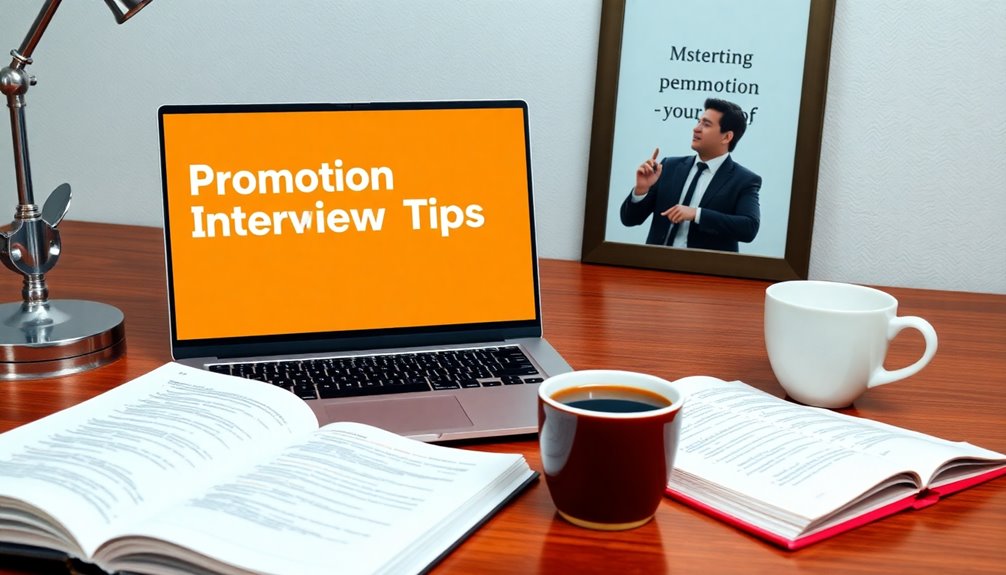Job Interview
Unlocking Success in Final Interviews
Optimize your final interview performance with key strategies that can elevate your candidacy—discover the secrets to standing out and securing your dream job.

Revealing success in final interviews means showcasing your skills and cultural fit effectively. Be ready for key questions about your strengths, weaknesses, and how you handle challenges. Research salary benchmarks, and frame negotiations as collaborative conversations. Remember to communicate clearly and confidently, managing stress by practicing your responses. After the interview, follow up with a thoughtful thank-you note that highlights your interest and key points from your discussion. This proactive approach not only reinforces your candidacy but also positively influences the hiring decision. Want to uncover more strategies to impress in your final interview? Keep exploring your options.
Key Takeaways
- Prepare for key questions by reflecting on past experiences and aligning them with the company's values and needs.
- Research salary standards to confidently negotiate compensation, presenting a range based on market insights.
- Practice active listening during the interview to engage with the interviewer and demonstrate your problem-solving approach.
- Follow up with a thank-you email, reiterating your interest and highlighting how your skills match the role.
- Showcase your long-term potential by discussing how your goals align with the company's vision and culture.
Purpose of the Final Interview

The final interview acts as a pivotal moment in your job search journey, where senior management or HR takes a closer look at your fit for the organization.
This stage goes beyond evaluating your qualifications; it's about building rapport and demonstrating how well you align with the company's culture.
You'll interact with potential colleagues and management, giving you valuable insight into their values and work environment.
It's your chance to showcase not just your skills but also your potential for a long-term professional relationship.
Remember, this interview greatly influences the hiring decision, as it evaluates how well you mesh with the team and the overall organization.
Stay focused, be genuine, and let your personality shine through. Demonstrating strong communication skills during this stage can significantly enhance your chances of making a lasting impression.
Key Questions to Anticipate

Anticipating key questions during the final interview can considerably boost your confidence and performance.
You should prepare for specific inquiries that showcase your compatibility with the role and company culture.
Here are four common questions to expect:
- Can you describe a challenging situation and how you handled it?
- What are your greatest strengths and weaknesses?
- How do you prioritize tasks when under pressure?
- Why do you believe you're the best fit for this position?
Salary Negotiation Strategies

When it comes to salary negotiations, preparation is key. Start by researching industry salary standards for similar roles to understand what you can reasonably expect.
When the topic arises, offer a salary range instead of a fixed number. This shows flexibility while ensuring your minimum acceptable salary is comfortable. Use your market research to back up your expectations, making it clear why you deserve the figure you've proposed.
Remember, negotiations are a conversation, not a confrontation; listen actively and be open to counteroffers. If the initial offer falls short, express your enthusiasm for the role while discussing the value you bring to the team. Additionally, consider how retirement planning can impact your overall compensation package, as it may be a factor in your long-term financial strategy.
This approach sets a positive tone and keeps the dialogue constructive.
Managing Conflict Effectively

Steering through conflict effectively is essential for maintaining a positive work environment and fostering teamwork.
When you face disagreements, consider these strategies to manage conflict:
- Listen Actively: Pay attention to the other person's perspective without interrupting. This shows respect and helps you understand their feelings.
- Stay Calm: Keep your emotions in check. Responding calmly can de-escalate tensions and lead to constructive dialogue.
- Find Common Ground: Identify shared goals or interests. This can bridge differences and encourage collaboration.
- Propose Solutions: Suggest actionable steps to resolve the conflict, inviting input from others to foster a cooperative atmosphere.
Coping With Stress in Interviews

Managing stress during interviews is essential for showcasing your best self to potential employers. To cope effectively, start by preparing thoroughly. Research the company and practice common questions, so you feel ready.
When anxiety creeps in, use deep breathing techniques to calm your mind. Visualize success before the interview; this positive imagery can boost your confidence.
Remember to stay organized—arrive early, and bring necessary materials to reduce last-minute stress. During the interview, focus on the conversation rather than your nerves; maintain eye contact and listen actively.
If a stress-related question arises, use the STAR method to structure your response. Finally, don't forget to take care of yourself leading up to the interview—get enough sleep and eat well to stay sharp. Additionally, consider implementing a retirement savings plan to alleviate financial worries, allowing you to concentrate better on your interview performance.
Communicating Clearly and Confidently

Effective communication is key to making a strong impression during your final interview. You want to guarantee your thoughts are articulated clearly and confidently. Here are some strategies to help you shine:
- Be Concise: Stick to the point without rambling; it shows you respect their time.
- Use Positive Body Language: Maintain eye contact and sit up straight to convey confidence.
- Practice Active Listening: Show engagement by nodding and summarizing questions before answering.
- Eliminate Filler Words: Replace "um" and "like" with pauses; they can detract from your message.
Importance of Follow-Up Communication

Following up after your final interview is an essential step that can set you apart from other candidates. A well-crafted thank-you email shows your appreciation and reinforces your interest in the position.
It's your chance to highlight key points from your conversation and reiterate how your skills align with the company's needs. This proactive approach not only demonstrates professionalism but also keeps you top-of-mind for the hiring team.
Remember, the follow-up is more than just politeness; it's a strategic move that can influence their decision. Make sure to keep your message concise, express gratitude, and maintain a positive tone.
Doing this effectively can strengthen your candidacy and leave a lasting impression on potential employers.
Frequently Asked Questions
What Should I Wear to a Final Interview?
When deciding what to wear to a final interview, aim for professional attire that aligns with the company culture.
You can't go wrong with a tailored suit, dress shirt, and polished shoes.
If the company leans more casual, smart business casual can work too, like slacks and a nice blouse or shirt.
Don't forget to pay attention to grooming—clean hair and minimal accessories can make a strong impression.
Confidence in your appearance matters!
How Long Does a Final Interview Usually Last?
A final interview usually lasts between 30 minutes to an hour.
It's your chance to engage with senior management and discuss your fit for the role. During this time, you'll likely answer questions about your experiences, skills, and how you align with the company culture.
Be prepared to ask your own questions too, as this shows your interest and helps you gauge if the company is right for you.
Who Will Be Present During the Final Interview?
During your final interview, you can expect to meet with senior management or an HR manager.
They'll assess your fit within the company and evaluate your potential for a long-term relationship. You might also interact with potential colleagues, which gives you a glimpse into the company culture.
This diverse presence is essential, as it helps both you and the interviewers gauge how well you align with the organization's values and dynamics.
Can I Ask Questions During the Final Interview?
Absolutely, you can ask questions during the final interview!
Imagine you're sitting across from the hiring manager, and after discussing your qualifications, you ask, "How does the team handle conflicts?" This shows your interest and helps you gauge the work environment.
Questions like this not only engage the interviewer but also demonstrate your proactive approach.
What Should I Do if I Don't Know an Answer?
If you don't know an answer during the interview, it's okay to admit it.
Stay calm and take a moment to think before responding. You can say something like, "That's a great question. I'm not sure about that specific detail, but I'd approach it by…"
This shows honesty and problem-solving skills.
Remember, interviewers appreciate genuine responses and your ability to handle uncertainty gracefully.
Always pivot to related experiences or knowledge you have.
Conclusion
As you prepare for your final interview, remember that this is your chance to truly connect with the company and showcase your unique fit. By anticipating key questions, effectively managing stress, and communicating confidently, you can leave a lasting impression. Don't underestimate the power of a thoughtful follow-up—could it be the final touch that sets you apart from other candidates? Embrace this opportunity, and you just might land your dream job!
Eugene brings a fresh, dynamic voice to our platform as one of our talented Writers. Specializing in research-driven content, he explores the latest findings in psychology and personal growth, translating them into actionable insights for our readers. Eugene’s work is fueled by a curiosity about what makes us tick and a desire to help others unlock their potential.
Job Interview
Mastering Promotion Interviews: Essential Insights
In mastering promotion interviews, learn the essential insights that can elevate your career, but what key strategies will set you apart from the competition?

Mastering promotion interviews means being well-prepared and strategically showcasing your achievements. Start by reflecting on your goals like salary and growth. Engage with colleagues to understand promotion standards, and discuss your ambitions with your manager for transparency. Create a strong case by compiling your accomplishments and aligning them with the job description. Practice common interview questions and prepare a focused action plan. During the interview, present your case confidently and listen to feedback. If you face rejection, respond professionally and seek constructive criticism. There's more to uncover about the nuances of this process to guarantee your success.
Key Takeaways
- Clearly articulate your personal expectations regarding salary, recognition, and growth during the promotion interview.
- Compile specific examples of accomplishments that demonstrate your readiness for the new role.
- Research the job description and align your skills with the responsibilities and company values.
- Prepare to answer common interview questions while showcasing your strengths and contributions.
- Engage actively with management, listen to feedback, and be open to development suggestions.
Preparing for Promotion Discussions

When gearing up for promotion discussions, it's vital to take a step back and reflect on what you truly want from the opportunity.
Consider your personal expectations, like salary, recognition, and growth. Engage with senior colleagues to gain insights into what's typically expected for promotions.
Be clear about whether you're seeking a salary increase or support in other forms. Think about your preferences: do you want more management responsibilities, or do you prefer focusing on individual contributions?
It's also important to discuss your intentions with your current manager for transparency and feedback.
Finally, research the new role thoroughly, including daily tasks and required skills, to guarantee your aspirations align with the company's mission and values. Additionally, understanding your company's leadership values can help you effectively communicate your alignment with their goals during the promotion discussion.
Building a Strong Case

To secure a promotion, you need to build a strong case that clearly demonstrates your qualifications and contributions. Start by researching the average salaries for the desired position to establish a factual basis for your request.
Review your current performance metrics and compare them against job expectations, identifying specific strengths. Compile examples of how you've exceeded your role's responsibilities, highlighting measurable achievements.
Create a portfolio showcasing these successes, as tangible evidence strengthens your argument. Clearly articulate your reasons for seeking the promotion, backed by data and metrics.
Finally, analyze the job description to illustrate how you've already taken on additional responsibilities, emphasizing your readiness for the new role. Additionally, consider establishing clear savings goals that can demonstrate your commitment to long-term planning, which may resonate with management's priorities. This thorough approach will make your case compelling.
Promotion Interview Preparation

Preparing for a promotion interview requires careful attention to detail and a proactive mindset. Start by reflecting on your accomplishments and how they align with the new role's responsibilities. Research the position thoroughly, noting required skills and daily tasks. Here's a quick table to help you organize your preparation:
| Focus Area | Action Steps |
|---|---|
| Personal Expectations | Identify salary, recognition, and growth |
| Research the Role | Review job description and company values |
| Accomplishments | Compile examples of past successes |
| Common Questions | Prepare answers for typical interview queries |
Engaging With Management

Engaging with management effectively is essential for a successful promotion discussion. Start by scheduling a dedicated meeting, signaling the importance of your conversation. Use a clear title, like "Growth Discussion," to set the tone.
Prepare for potential questions or concerns they might raise. Demonstrate your understanding of the company's goals and how you can contribute to them in your new role.
Be direct and confident in presenting your case, highlighting your accomplishments and readiness for increased responsibilities. Listen actively to their feedback, showing you're open to their insights.
Incorporating data-driven decision-making into your discussions can further illustrate your strategic thinking and alignment with the company's vision.
This approach not only showcases your commitment to growth but also builds a positive rapport with management, reinforcing your suitability for the promotion.
Handling Rejection Professionally

Receiving a rejection after a promotion discussion can be disheartening, but how you handle it can make a significant difference in your professional journey.
First, take a moment to process your feelings—it's natural to feel disappointed. Once you're ready, respond professionally. Thank your manager for the opportunity and express your commitment to growth.
Ask for specific feedback on your performance and what skills you can develop for future consideration. Setting SMART goals based on this feedback shows your dedication.
Keep the lines of communication open, demonstrating your willingness to learn.
Finally, focus on your current role—continue delivering high-quality work and supporting your team. This proactive approach not only enhances your skills but also positions you favorably for future opportunities.
Impact on Work Relationships

Although promotions can elevate your career, they can also shift dynamics within your team. You might find that your relationships with colleagues change as they adjust to your new role.
To navigate this, maintain open communication. Be transparent about your goals, and show your willingness to support your team. Acknowledge their contributions and foster an inclusive environment, as this will help build trust.
It's important to avoid any perception of favoritism; treat all team members fairly. Additionally, consider mentoring others to strengthen bonds and enhance collaboration. Establishing trust issues can hinder teamwork, so addressing concerns openly will promote a healthier work environment.
Setting Future Goals

How do you guarantee your future goals align with your new role after a promotion? Start by identifying specific, actionable objectives that not only reflect your aspirations but also meet the company's expectations.
Break down your goals into short-term and long-term targets, making sure they resonate with the responsibilities of your new position. Engage regularly with your team and management to assure alignment and gather feedback.
Focus on fostering team morale and encouraging collaboration, as these will enhance your leadership effectiveness. Finally, commit to continuous learning and development to adapt to evolving challenges. Additionally, prioritizing self-care practices can help maintain your well-being and performance in your new role.
Frequently Asked Questions
What Should I Wear to a Promotion Interview?
For your promotion interview, you'll want to dress professionally to reflect your seriousness about the opportunity.
Choose a tailored suit or a smart dress that aligns with your company's culture. Stick to neutral colors for a polished look, and make certain your clothes are clean and pressed.
Pay attention to your shoes; they should be formal and comfortable.
How Can I Manage Nerves Before the Interview?
Did you know that around 70% of people experience anxiety before interviews?
To manage your nerves, practice deep breathing exercises to calm your mind.
Visualize a successful interview to boost your confidence.
Prepare thoroughly by reviewing your accomplishments and the role's requirements.
Engage in mock interviews with a friend to simulate the experience.
Finally, remember, it's just a conversation about your future; focus on sharing your value and passion for the role.
Should I Bring a Copy of My Resume?
Yes, you should definitely bring a copy of your resume to the promotion interview.
It serves as a handy reference for both you and the interviewers. Your resume highlights your achievements and qualifications, reinforcing your case for promotion.
Plus, it shows you're prepared and professional. Even if they've it on file, having a copy on hand can help you discuss your experiences and contributions more effectively during the conversation.
How Long Should My Promotion Interview Last?
Your promotion interview should ideally last between 30 to 60 minutes.
This timeframe allows you to discuss your accomplishments, aspirations, and fit for the new role while giving your manager space to ask questions.
Keep your answers concise but thorough, ensuring you cover key points without rambling.
If conversations flow naturally, it's okay to extend a bit, but aim to respect everyone's time and maintain focus on the promotion discussion.
Can I Negotiate My Salary After Receiving a Promotion Offer?
Yes, you can negotiate your salary after receiving a promotion offer.
It's important to approach the conversation professionally and confidently. Start by researching industry standards and your company's compensation trends.
Clearly articulate your value, highlighting your achievements and the additional responsibilities you'll take on.
Be open to discussing other benefits too, like bonuses or extra vacation days, if salary flexibility is limited.
A respectful dialogue can lead to a favorable outcome for both parties.
Conclusion
As you gear up for your promotion interview, remember that preparation is your strongest ally. Like a well-tuned instrument, your confidence and clarity will resonate during the discussion, showcasing your readiness for new challenges. Embrace the insights you've gathered, articulate your achievements, and engage genuinely with your interviewers. Regardless of the outcome, each experience sharpens your skills and sets the stage for future success. Trust in your abilities, and let your passion shine through.
Eugene brings a fresh, dynamic voice to our platform as one of our talented Writers. Specializing in research-driven content, he explores the latest findings in psychology and personal growth, translating them into actionable insights for our readers. Eugene’s work is fueled by a curiosity about what makes us tick and a desire to help others unlock their potential.
Job Interview
The One Interview Question That Trips Everyone Up—Except You!
The key to mastering the trickiest interview question lies in your unique approach—discover how to turn the tables in your favor!

The question "Tell me about yourself" often trips candidates up, but you've got the advantage. Start with a concise elevator pitch that highlights your strengths and recent relevant experiences. Share a specific challenge you've faced and what you learned, showcasing your problem-solving skills. Remember to align your response with the company's values for added impact. Being self-aware and demonstrating growth from past experiences can set you apart. Approach this staple question with confidence, and you'll not only ease your nerves but also impress your interviewer. Keep going to discover more strategies for mastering the interview process!
Key Takeaways
- Craft a concise elevator pitch that highlights your key strengths and relevant experiences to answer the common interview opener effectively.
- Use storytelling techniques to create engaging responses that connect your background to the job and the company's culture.
- Practice articulating your experiences and challenges to demonstrate self-awareness and resilience, making your answer memorable.
- Research the company's values and mission to tailor your response, showcasing your commitment and fit within the organization.
- Prepare for potential follow-up questions to maintain confidence and clarity, ensuring a smooth continuation of the conversation.
Understanding the Question

Understanding the question "Tell me about yourself" is essential for a successful interview. This question often kicks off the conversation, and how you respond can set the tone for the entire interview. Many job candidates struggle with it, leading to lengthy or unfocused answers that can overshadow their qualifications. Instead of rambling, aim for a concise response lasting 1-2 minutes.
When answering this question, remember that interviewers use it to gauge your confidence, self-awareness, and communication skills. They want to see how well you can articulate your experiences and strengths in relation to the job. A well-crafted answer should highlight key strengths and relevant experiences tailored to the role and company culture.
This is your chance to make a strong first impression, so consider what aspects of your background align with what the employer values. Reflect on your previous roles, achievements, and the skills that set you apart. Being prepared to answer this question effectively can greatly enhance your chances of moving forward in the interview process, showcasing your potential as a strong candidate. Additionally, showcasing skills relevant to AI online jobs can further demonstrate your adaptability in a rapidly changing job market.
Framing Your Response

Crafting a focused response to the "Tell me about yourself" question can greatly impact your interview performance. To answer this question effectively, you should concentrate on your strengths and relevant experiences that align with the role. Keep your response structured and concise, ideally lasting 1-2 minutes.
Consider these key elements when framing your response:
- Highlight a recent challenge: Discuss how you tackled it and the lessons learned, showcasing your problem-solving skills.
- Tailor your answer: Emphasize experiences that demonstrate your culture fit and the specific skills sought by the employer.
- Engage with anecdotes: Share brief stories that connect your background to the job, illustrating your enthusiasm and qualifications.
- Emphasize resilience: Drawing on experiences, such as navigating a divorce process, can showcase your ability to overcome personal challenges and adapt to new circumstances.
Showcasing Self-Awareness

While self-awareness might seem like a soft skill, it plays a critical role in how you present yourself during interviews. Employers value candidates who can reflect on their strengths and weaknesses, showcasing maturity. When you're faced with interview questions about your weaknesses, don't shy away. Instead, discuss them openly and highlight the steps you've taken for personal growth. This approach shows your commitment to improving yourself.
To further demonstrate self-awareness, share specific examples of past challenges you've faced and the lessons learned. This not only highlights your resilience but also your adaptability in professional settings. Interviewers appreciate candidates who can articulate these experiences clearly, as it enhances your communication skills and keeps the conversation engaging.
Moreover, be prepared to discuss how your co-workers perceive you. Responses that align with the job requirements can greatly strengthen your position. By articulating your self-awareness, you create a powerful impression that you're not only aware of your capabilities but also actively working on your development. This level of insight can set you apart and make you a memorable candidate in the eyes of interviewers. Additionally, practicing techniques such as nighttime meditation can help improve your focus and reduce anxiety before the interview, further enhancing your performance.
Strategies for Improvement

To enhance your interview performance, focus on developing targeted strategies that highlight your strengths and align with the job's requirements. When faced with tricky interview questions, such as those about leaving your last job, you want to respond confidently and clearly. Here are some effective strategies for improvement:
- Craft a concise elevator pitch that emphasizes your key strengths and experiences relevant to the position.
- Utilize storytelling techniques to create engaging narratives that showcase your skills and make your responses memorable.
- Research the company's culture and values to tailor your answers, demonstrating your understanding of their mission and goals. Additionally, practicing in front of small groups can help you develop your public speaking skills, making you more articulate during interviews.
Aligning With Company Values

Understanding and aligning with company values can greatly enhance your interview success. When candidates resonate with an organization's mission, they're 30% more likely to stay engaged and committed to their roles. Researching a company's core values before an interview gives you insights into its culture, allowing you to tailor your responses effectively.
Demonstrating how your personal values align with the company's is essential. Prepare specific examples that showcase your commitment and fit, as this can help you navigate interview questions that trip many candidates up. Companies that prioritize value alignment report 25% higher employee satisfaction, indicating that understanding these values improves your job fit and team cohesion.
Additionally, don't overlook the importance of diversity and inclusion. Many organizations actively seek candidates who support these initiatives, so make sure to highlight your understanding and commitment to these core values. By aligning with company values, you not only increase your chances of impressing interviewers but also position yourself as a well-rounded candidate who truly cares about the organization's mission. Furthermore, demonstrating a knowledge of diverse investment options can show your ability to adapt and thrive in various environments, reflecting a mindset that aligns well with innovative companies.
Frequently Asked Questions
What Is the Most Common Interview Question That Trips People Up?
The most common interview question that trips you up is "Tell me about yourself." It's open-ended, and many candidates struggle to keep their responses concise and relevant. Instead of getting lost in personal stories, focus on crafting a succinct elevator pitch that highlights your strengths and relevant experiences. This sets a positive tone for the interview and showcases your confidence, self-awareness, and communication skills, which are essential for making a great first impression.
What Is the Most Dreaded Interview Question?
You sit down, heart racing, and then it hits you—"Tell me about yourself." It's the question that sends chills down every candidate's spine. You know it's coming, yet you can't help but feel unprepared. To tackle it, you've gotta craft a concise narrative that highlights your strengths and experiences. Focus on what aligns with the job, and remember, it's your chance to shine. You've got this; just keep it clear and engaging!
What Is the Hardest Interview Question to Answer?
The hardest interview question to answer often revolves around "Tell me about yourself." You need to condense your personal and professional journey into a brief, compelling narrative that aligns with the job. It's essential to highlight your strengths and experiences while making a strong first impression. Many candidates struggle with this because they either ramble or fail to connect their background to the role, leaving interviewers wanting more clarity and relevance.
What Are Top 5 Behavioral Interview Questions?
Imagine stepping onto a stage, spotlight shining bright, as you face the top five behavioral interview questions. You'll likely encounter: "Describe a time you faced a significant challenge," "How did you work on a team?" "Tell me about handling a difficult customer," "Can you discuss a situation where you demonstrated leadership?" and "What's an example of resolving conflict?" Prepare your stories; they'll showcase your skills and experiences vividly.
Conclusion
So, as you stride into that interview, armed with your witty retorts and dazzling charm, remember: the dreaded question isn't a dragon to slay, but a quirky puppy waiting for a belly rub. Embrace it! Showcase your self-awareness like it's your new designer handbag, and align your answers with the company's values as if you're auditioning for a role in a corporate rom-com. With this mindset, you won't just survive; you'll waltz out with the job!
Felicity, our Author, pens in-depth articles and guides that delve into the heart of personal discovery. Her narrative-driven approach weaves together theory, practice, and personal anecdotes, making the journey of self-exploration both relatable and inspiring. Felicity’s contributions help illuminate the path for those seeking a deeper understanding of themselves and their relationships.
Job Interview
Unlocking Job Opportunities: Your Discovery Story
Get ready to uncover the secrets of your personal discovery story and learn how it can transform your job search journey.

Revealing job opportunities starts with your personal discovery story. You need to identify what motivates you; this self-awareness helps align you with the right company culture. Craft your response to clearly communicate why you're drawn to the role and how your skills match the job requirements. Show genuine enthusiasm for the company's mission and highlight your potential for growth. Leverage your connections for insights and referrals, as these can provide a competitive edge. By focusing on these elements, you can effectively showcase your strengths and fit for the position. Keep exploring to uncover more strategies for success.
Key Takeaways
- Reflect on personal motivations to clearly express why you're drawn to specific job opportunities.
- Utilize connections for insights about company culture and job roles to inform your application.
- Engage in networking events to expand professional relationships and discover hidden job opportunities.
- Craft tailored responses that highlight relevant skills and experiences aligned with job descriptions.
- Show genuine enthusiasm for the organization's mission and projects to stand out as a candidate.
Understanding Your Motivation

Understanding your motivation is essential when exploring job opportunities. When you identify what drives you, you can make informed decisions that align with your career goals.
Reflect on why you're drawn to a specific role or company; this self-awareness can highlight your internal connections with the organization. Employers want to know your reasons for applying, as this reveals your fit with their culture and values.
Additionally, consider how you discovered the job posting; internal referrals can give you a competitive edge and offer insight into the company from someone who knows it well.
Crafting Your Response

When preparing your response to the question about your interest in a position, think of it as a chance to spotlight your qualifications.
Start by clearly articulating what draws you to the role and the company. Mention specific aspects of the job description that resonate with your skills and experiences.
Be honest about how you discovered the position, whether through a referral, job board, or career page. Highlight your relevant qualifications and how they align with the company's goals.
This isn't just about your past; it's also about how you envision contributing to the team. Keep your answer concise and focused, showcasing your fit for the role while laying the groundwork for discussing your enthusiasm later.
Showcasing Your Enthusiasm

Showcasing your enthusiasm for a position can greatly impact how potential employers perceive your fit for the role. When you express genuine interest, you demonstrate your commitment to the company's mission and values.
Start by sharing specific reasons why you're excited about the role, such as unique projects or the company culture. Highlight your alignment with their goals and mention any research you've conducted about the organization.
Discuss how you see yourself growing within the company and contributing to its success. This not only shows you're informed but also passionate about the opportunity. Additionally, expressing your enthusiasm aligns with the Law of Attraction principles, which emphasize that positive energy can attract positive outcomes.
Finally, let your personality shine through; authentic enthusiasm can leave a lasting impression and set you apart from other candidates.
Leveraging Your Connections

Leveraging your connections can greatly enhance your chances of landing a job. Your network is a valuable resource, and tapping into it can provide insights and opportunities you mightn't find on your own.
Here are some effective ways to utilize your connections:
- Reach out to friends or colleagues working at your target company.
- Ask for informational interviews to learn more about the company culture.
- Utilize LinkedIn to connect with employees in your field.
- Attend industry events or networking meetups to expand your circle.
- Seek referrals from connections who believe in your skills.
Real-Life Response Examples

Drawing on real-life examples can considerably enhance your ability to answer the common interview question about how you found the job. Here are some scenarios you might consider sharing:
| Source of Discovery | Relationship/Context | Key Highlights |
|---|---|---|
| Employee Referral | Friend from college | "They believed I'd fit well." |
| Online Job Posting | Company's careers page | "The projects align with my skills." |
| Recruiter Connection | Past collaboration | "They knew my experience well." |
| Networking Event | Industry conference | "I was impressed by the company culture." |
These examples not only illustrate your journey but also demonstrate your enthusiasm and fit for the role. Tailor your response to reflect your unique experiences!
Frequently Asked Questions
How Do I Tailor My Answer for Different Company Cultures?
To tailor your answer for different company cultures, start by researching each company's values and mission. Identify what resonates with you and align your response to reflect that.
Use specific examples that showcase your fit within their culture, such as teamwork or innovation. Highlight experiences that illustrate your adaptability.
Finally, express genuine enthusiasm for how you can contribute to their unique environment, making sure your tone matches their workplace vibe.
What if I Found the Job Posting Through Social Media?
Finding a job posting through social media is like discovering a hidden gem in a vast treasure chest.
You've stumbled upon an opportunity that resonates with your skills and passions.
When you mention this in an interview, highlight your excitement about the role and how the company's values align with yours.
Share what drew you in on social media, and emphasize your enthusiasm for being part of their team!
Can I Mention Multiple Sources Where I Discovered the Job?
Yes, you can mention multiple sources where you discovered the job. Highlighting various avenues shows your proactive approach and genuine interest in the position.
For instance, if you found the job through social media, a referral, and the company's website, share those details. This not only demonstrates your enthusiasm but also reflects your thorough research about the company.
Just be honest and concise in your response to keep it engaging.
Is It Important to Mention Any Negative Aspects of the Company?
Sure, it's not a great idea to bring up negative aspects of the company during your interview. You want to keep the vibe positive, right?
Instead, focus on what excites you about the role and the company culture. If you've done your homework, you'll find plenty of positives to discuss.
This way, you present yourself as someone who's genuinely interested and ready to contribute to the team's success.
How Can I Follow up After Applying for the Position?
After applying for a position, you should follow up within a week or two.
Send a brief, polite email expressing your continued interest and inquiring about the status of your application. Keep it professional and concise.
If you have a connection within the company, consider reaching out to them for insights. This shows initiative and enthusiasm, making you stand out among other candidates.
Conclusion
In closing, your discovery story is more than just a way to share how you found a job; it's a chance to connect your journey with the company's mission, to showcase your passion for the role, and to highlight the relationships that brought you here. Embrace this opportunity to share your unique narrative, to express your enthusiasm, and to demonstrate your fit. Remember, your story can open doors and set you apart in a competitive job market.
Eugene brings a fresh, dynamic voice to our platform as one of our talented Writers. Specializing in research-driven content, he explores the latest findings in psychology and personal growth, translating them into actionable insights for our readers. Eugene’s work is fueled by a curiosity about what makes us tick and a desire to help others unlock their potential.
-

 Love Compatibility between Zodiac Signs2 months ago
Love Compatibility between Zodiac Signs2 months agoRat Compatibility in the Chinese Zodiac: Which Signs Are the Perfect Match?
-

 Love Compatibility between Zodiac Signs2 months ago
Love Compatibility between Zodiac Signs2 months agoCat Zodiac Compatibility: Which Signs Are Most Compatible With Cats?
-

 Love Compatibility between Zodiac Signs3 months ago
Love Compatibility between Zodiac Signs3 months agoThe Ultimate Guide to Throuple Zodiac Compatibility
-

 Love Compatibility between Zodiac Signs3 months ago
Love Compatibility between Zodiac Signs3 months ago10 Mother-Daughter Zodiac Combinations That Have Natural Compatibility
-

 Love Compatibility between Zodiac Signs2 months ago
Love Compatibility between Zodiac Signs2 months agoHow to Assess Snake Compatibility in the Chinese Zodiac
-

 Love Compatibility between Zodiac Signs1 month ago
Love Compatibility between Zodiac Signs1 month agoDiscover Your Family's Zodiac Compatibility With This Calculator
-

 Love Compatibility between Zodiac Signs1 month ago
Love Compatibility between Zodiac Signs1 month agoChinese Zodiac Compatibility: How Does the 1957 Year of the Rooster Interact With Other Signs?
-

 Love Compatibility between Zodiac Signs3 months ago
Love Compatibility between Zodiac Signs3 months agoOctober 22 Zodiac Compatibility: Who Is the Perfect Match for Your Sign?








